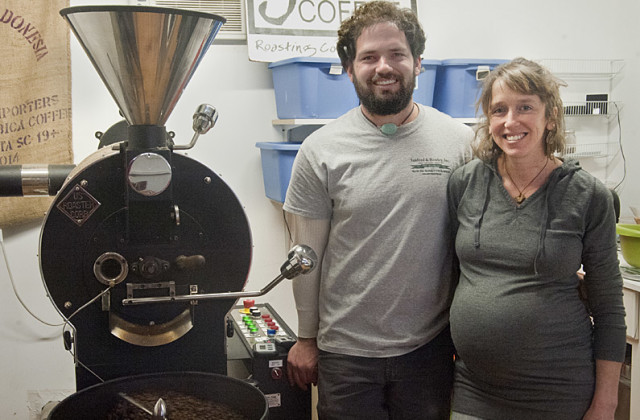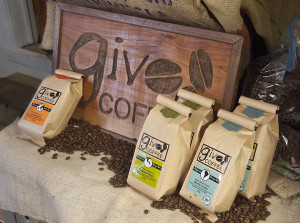Local Roasters Think Globally
Giv Coffee Blends Profits and Philanthropy
By Ruth Melville
You may have noticed a new stand at the winter farmers markets in Town Hall. Since February, Emily and Jeff Brooks, of Giv Coffee in Torrington, have begun bringing their colorful bags of freshly roasted coffee to sell at the market.
The Brookses are passionate about the quality of their coffee, but they are also passionate about helping others, and a share of their profits goes to charity. The motto of their business is simple and to the point: “Good Coffee. Good Cause.”
Before moving to Torrington, the Brookses did mission work overseas, especially in Africa and Thailand. When they came back to the United States, they felt they needed to make a life change, but after what they had seen and done, simply earning a living wasn’t enough. They wanted to commit to a project that would integrate philanthropy and profits.
The couple had friends who had started a philanthropic coffee-roasting business in Kentucky. When they went to check out their business model, the Brookses were impressed, and it didn’t hurt that Jeff Brooks had always been interested in coffee.
Three years on, he has become expert in sourcing raw coffee beans.
Most of Giv’s coffee is grown on very small farms, one hectare or less. They also look for beans grown at 1,000 to 2,000 meters above sea level, where it’s cool enough to slow down bean development, so the sugars can condense.
To get the quality of beans he needs, Brooks works with importers who buy from individual farmers and keep their beans separate. Typically, such small producers would be bunched together and sold under a vague regional label.
“This is the new way of doing business,” he says. “It’s not just fair trade. We pay high guaranteed prices on the basis of quality. We’ve ended up paying four times the fair trade price. The rewards end up in the cup and in the farmer’s pocket.”
“Garbage in, garbage out,” he adds. “The roaster can actualize a coffee that’s already good, but it can’t rescue the coffee.” Doing the roasting himself allows Brooks to make a lot of adjustments: how fast the air flows over the beans, the height of the flame and the speed of the drum. The Brookses keep meticulous records, not just to maximize flavor but also to make sure they can repeat that flavor batch after batch.
Giv’s beans come from the four main coffee-growing regions: Africa, Southeast Asia, Central America and South America. Their attractive bags, designed by Emily Brooks, who is also in charge of overall operations for the business, are color-coded by area, and show a map of the region where the coffee in the bag was grown. Part of Giv’s social mission is to educate the consumer about where and how coffee is produced.
For every bag sold, the Brookses give two dollars to people in need. When possible, they like to have the money go back to the area where the coffee was grown, so they give to an orphanage in Nicaragua and to a group in Bangkok that works with children at risk in the red-light district. But they also want to give locally, so they help support a tutoring and summer camp program in Hartford’s North End.
So far the Brookses have been selling their coffee mostly at local farmers markets—Collinsville, Torrington and Avon in the summer; Norfolk in the winter. In 2014 they sold about 2,500 retail bags of coffee, which enabled them to give $5,000 to charity.
This spring the Brookses are taking a new step. They’ll continue selling coffee at farmers markets, but in May they plan to open a café in Canton, where they will sell coffee beans, drinks and food. The roaster will be in the shop, so customers can watch the process from green beans to finished latte.


